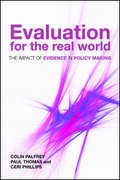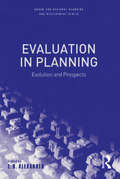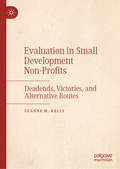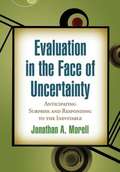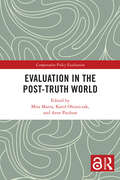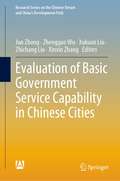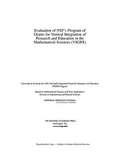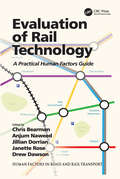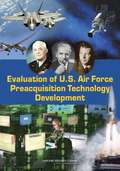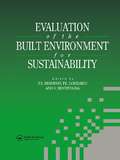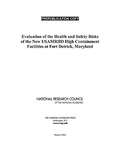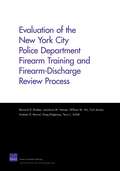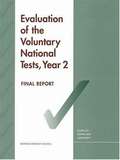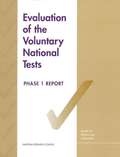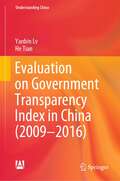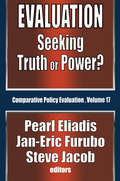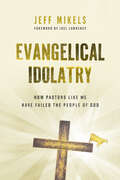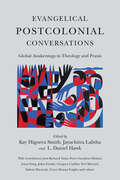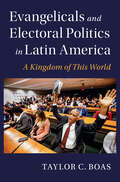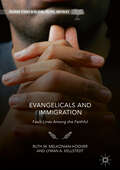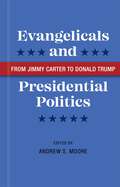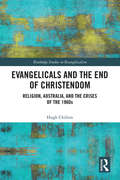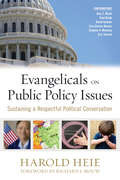- Table View
- List View
Evaluation for the Real World: The Impact of Evidence in Policy Making
by Paul Thomas Colin PalfreyEvaluation research findings should be a key element of the policy-making process, yet in reality they are often disregarded. This valuable book examines the development of evaluation and its impact on public policy by analysing evaluation frameworks and criteria which are available when evaluating public policies and services. It further examines the nature of evidence and its use and non-use by decision-makers and assesses the work of influential academics in the USA and UK in the context of evaluation and policy making. The book emphasises the 'real world' of decision-makers in the public sector and recognises how political demands and economic pressures can affect the decisions of those who commission evaluation research while providing recommendations for policymakers on adopting a different approach to evaluation. This is essential reading for under-graduate and post-graduate students of policy analysis and public sector management, and those who are involved in the planning and evaluation of public policies and services.
Evaluation in Planning: Evolution and Prospects
by E. R. AlexanderEvaluation is a critical stage in urban and regional planning and development, with the consideration of alternative proposals essential for informed debate and decision. Evaluation in planning has become even more important with the new paradigm attempting to integrate economic efficiency with equity, sustainability and social responsibility. The craft of pre-development evaluation has long been influenced by Nathaniel Lichfield, and in his honour, this book brings together prominent researchers and practitioners to discuss evaluation in planning: its conceptual foundations and subsequent development, its strengths and persisting dilemmas, and its best practices and their potential for improving future planning and development. The chapters trace evaluation in planning from its historical origin to current applications. Part one reviews the evolution of evaluation theory and practice, and part two contains a selection of best-practice application. The final integrating chapter notes key problems, and offers directions for future development in evaluation research and practice.
Evaluation in Small Development Non-Profits: Deadends, Victories, and Alternative Routes
by Leanne M. KellyResearch on evaluation shows that low-use and non-use of evaluation is common, yet evaluation is hailed as beneficial and worthwhile. The worth of evaluation is tied to its utilisation, presenting a paradox if evaluation is both revered and underutilised. This book investigates this paradox in the under-researched context of small development non-profit organisations, which have specific resource constraints and ‘bottom up’ community development values that complicate their ability to do and use evaluation in line with top down directives. The book examines the utility, meaningfulness, and purpose of evaluation from small non-profit perspectives, and explores whether evaluation has value for these organisations. For development practice, it presents evaluative alternatives that reconceptualise evaluation as part of the active process of development rather than as an interval-based add-on. For evaluation theory, it highlights a historical preoccupation with improving evaluation without assessing its inherent worth, and considers alternative ways to enhance the value of evaluation for small non-profits.
Evaluation in the Face of Uncertainty
by Jonathan MorellUnexpected events during an evaluation all too often send evaluators into crisis mode. This insightful book provides a systematic framework for diagnosing, anticipating, accommodating, and reining in costs of evaluation surprises. The result is evaluation that is better from a methodological point of view, and more responsive to stakeholders. Jonathan A. Morell identifies the types of surprises that arise at different stages of a program's life cycle and that may affect different aspects of the evaluation, from stakeholder relationships to data quality, methodology, funding, deadlines, information use, and program outcomes. His analysis draws on 18 concise cases from well-known researchers in a variety of evaluation settings. Morell offers guidelines for responding effectively to surprises and for determining the risks and benefits of potential solutions.
Evaluation in the Post-Truth World (Comparative Policy Evaluation)
by Mita Marra, Karol Olejniczak, and Arne PaulsonEvaluation in the Post-Truth World explores the relationship between the nature of evaluative knowledge, the increasing demand in decision-making for evaluation and other forms of research evidence, and the post-truth phenomena of antiscience sentiments combined with illiberal tendencies of the present day. Rather than offer a checklist on how to deal with post-truth, the experts found herein wish to raise awareness and reflection throughout policy circles on the factors that influence our assessment and policy-related work in such a challenging environment. Journeying alongside the editor and contributors, readers benefit from three guiding questions to help identify specific challenges but tools to deal with such challenges: How are policy problems conceptualized in the current political climate? What is the relationship between expertise and decision-making in today’s political circumstances? How complex has evaluation become as a social practice?Evaluation in the Post-Truth World will benefit evaluation practitioners at the program and project levels, as well as policy analysts and scholars interested in applications of evaluation in the public policy domain.Chapters 6, and 11 of this book are freely available as a downloadable Open Access PDF at http://www.taylorfrancis.com under a Creative Commons [Attribution-Non Commercial-No Derivatives (CC-BY-NC-ND)] 4.0 license.
Evaluation of Basic Government Service Capability in Chinese Cities (Research Series on the Chinese Dream and China’s Development Path)
by Jun Zhong Zhenggao Wu Xukuan Liu Zhichang Liu Xinxin ZhangThis book reports on the results of a survey of 38 major Chinese cities’ public service performances and provides an overview of the development of basic public services in the larger cities. The quality of urban public services is examined from 9 different perspectives: basic healthcare and public health, housing, public transportation, public security, employment and social security, compulsory education, urban environment, culture and sports, and government services. Moreover, a series of indices are applied to further study the degree of public satisfaction with basic public services in these cities. These indices include the index of GDP leveraging satisfaction with basic public services, the rising index of satisfaction with basic public services in cities, and the development index of satisfaction with the basic public service elements. On the basis of the survey results, this book also identifies the most important social issues among the surveyed public, including food and drinking water safety, information security, housing prices, pensions, and air and environment quality.
Evaluation of NSF's Program of Grants for Vertical Integration of Research and Education in the Mathematical Sciences (VIGRE)
by Committee to Evaluate the NSF's Vertically Integrated Grants for Research and Education (VIGRE) ProgramIn 1998, the National Science Foundation (NSF) launched a program of Grants for Vertical Integration of Research and Education in the Mathematical Sciences (VIGRE). These grants were designed for institutions with PhD-granting departments in the mathematical sciences, for the purpose of developing high-quality education programs, at all levels, that are vertically integrated with the research activities of these departments. To date, more than 50 departments at 40 institutions have received VIGRE awards. As requested by NSF, the present volume reviews the goals of the VIGRE program and evaluates how well the program is designed to address those goals. The book considers past and current practices for assessing the VIGRE program; draws tentative conclusions about the program's achievements based on the data collected to date; and evaluates NSF's plans for future data-driven assessments. In addition, critical policy and programmatic changes for the program are identified, with recommendations for how to address these changes.
Evaluation of Prolonged Use of IMF Resources
by International Monetary FundA report from the International Monetary Fund.
Evaluation of Rail Technology: A Practical Human Factors Guide (Human Factors in Road and Rail Transport)
by Jillian Dorrian Anjum Naweed Janette RoseRapid advancements in train control and in-cab technologies provide significant opportunities for rail operators to improve efficiency and enhance their operations. New technologies often provide elegant solutions to existing problems or new capabilities for the operator. However, new technologies may also represent a significant form of risk. Thus, it is important to balance the potential for significant improvement with justifiable concern about how the technology may unpredictably change the nature of the work. If a technology is designed and implemented without considering the substantive human factors concerns, that technology may lead to unintended consequences that can introduce safety issues and disrupt network performance. It is important to note that even a well-designed and beneficial technology may be rejected by the users who see it as a threat to their jobs, status or working conditions. This book discusses the issues surrounding rail technology and introduces a ’toolkit’ of human factors evaluation methods. The toolkit provides a practical and operationally focused set of methods that can be used by managers considering investing in technology, staff charged with implementing a technology, and consultants engaged to assist with the design and evaluation process. This toolkit can help to ensure that new rail technologies are thoughtfully designed, effectively implemented, and well received by users so that the significant investment associated with developing rail technologies is not wasted.
Evaluation of U.S. Air Force Preacquisition Technology Development
by National Research Council of the National AcademiesFrom the days of biplanes and open cockpits, the air forces of the United States have relied on the mastery of technology. From design to operation, a project can stretch to 20 years and more, with continuous increases in cost. Much of the delay and cost growth afflicting modern United States Air Force (USAF) programs is rooted in the incorporation of advanced technology into major systems acquisition. Leaders in the Air Force responsible for science and technology and acquisition are trying to determine the optimal way to utilize existing policies, processes, and resources to properly document and execute pre-program of record technology development efforts, including opportunities to facilitate the rapid acquisition of revolutionary capabilities and the more deliberate acquisition of evolutionary capabilities. Evaluation of U.S. Air Force Preacquisition Technology Development responds to this need with an examination of the current state of Air Force technology development and the environment in which technology is acquired. The book considers best practices from both government and industry to distill appropriate recommendations that can be implemented within the USAF.
Evaluation of the Built Environment for Sustainability
by P. S. Brandon P. L. Lombardi V. BentivegnaSustainability in the built environment is a major issue facing policy-makers, planners, developers and designers in the UK, Europe and worldwide. The measuring of buildings and cities for sustainability becomes increasingly important as pressure for green, sustainable development translates into policy and legislation. The problems of such measurement and evaluation are presented by the authors in contributions which move from the general to the particular, e.g. from a general framework for an environmentally sustainable form of urban development to a specific input-output model application to environmental problems. The book is divided into three parts: the first covers city models and sustainable systems - research programmes, environmental policies, green corporations and collaborative strategies to make urban development more sustainable; part two discusses the problems of evaluating the built environment in planning and construction, covering economic and environmental methods and construction, development and regeneration processes; part three illustrates a number of applications using different approaches and techniques and referring to a range of environmental aspects of the natural and built environment, from maintaining historic buildings to transport management and air pollution monitoring.
Evaluation of the Health and Safety Risks of the New USAMRIID High-Containment Facilities at Fort Detrick, Maryland
by National Research Council of the National AcademiesThe U.S. Army Medical Research Institute of Infectious Diseases in Frederick, Maryland, is designed to handle pathogens that cause serious or potentially lethal diseases, which require the research performed on them be contained to specialized laboratories. In 2007 a decision was made to expand those facilities causing concern among area residents that public health and safety risks, and strategies to mitigate those concerns were not adequately considered in the decision to go forward with the expansion. In Evaluation of the Health and Safety Risks of the New USAMRIID High Containment Facilities at Fort Detrick, Maryland a group of experts in areas including biosafety, infectious diseases, industrial hygiene, environmental engineering, risk assessment and epidemiology, explored whether measures were being taken to ensure prevention and mitigation of risk to the health and safety of workers and the public. They also assessed whether the procedures and regulations employed meet accepted standards of the Centers for Disease Control and Prevention and the National Institutes of Health. Evaluation of the Health and Safety Risks of the New USAMRIID High Containment Facilities at Fort Detrick, Maryland evaluates the health and safety aspects of the environmental impact statement developed to support the construction of the new laboratories and explores the institute's operating requirements, medical and emergency management response plans and communication and cooperation with the public. The book recommends that USAMRIID continue to set high standards for advancing security, operational, and biosurety measures, and that additional measures be taken to provide assurance that experienced medical professionals are readily available to consult on unusual infectious diseases. It also suggests that USAMRIID expand its two-way communications with the public.
Evaluation of the New York City Police Department Firearm Training and Firearm-Discharge Review Process
by Bernard D. Rostker Andrew R. Morral Carl Jensen William M. Hix Lawrence M. HanserIn January 2007, New York City Police Commissioner Raymond W. Kelly asked the RAND Corporation to examine the quality and completeness of the New York City Police Department's firearm-training program and identify potential improvements in it and in the police department's firearm-discharge review process. This monograph reports the observations, findings, and recommendations of that study.
Evaluation of the Voluntary National Tests, Year 2: Final Report
by Committee on the Evaluation of the Voluntary National Tests Year 2The National Academies Press (NAP)--publisher for the National Academies--publishes more than 200 books a year offering the most authoritative views, definitive information, and groundbreaking recommendations on a wide range of topics in science, engineering, and health. Our books are unique in that they are authored by the nation's leading experts in every scientific field.
Evaluation of the Voluntary National Tests: Phase 1
by Lauress L. WiseThe National Academies Press (NAP)--publisher for the National Academies--publishes more than 200 books a year offering the most authoritative views, definitive information, and groundbreaking recommendations on a wide range of topics in science, engineering, and health. Our books are unique in that they are authored by the nation's leading experts in every scientific field.
Evaluation on Government Transparency Index in China (Understanding China)
by He Tian Yanbin LvThis book presents the outcomes of a study on indices of rule by law in China conducted by the Chinese Academy of Social Sciences (CASS). Since 2009, a group of researchers at the CASS Institute of Law has worked to assess the Chinese government’s transparency. In this context, they designed an index system to truthfully record and reflect the reality and development of openness in the Chinese government for eight consecutive years. This book compiles their reports on each year’s development, systematically combining quantitative analysis and the status quo for each year. Thanks to these reports, readers will be able to clearly understand the evolution of the Chinese government’s openness during these eight years. They highlight what the government has done to improve transparency, what has been achieved, and the goals for the future. These reports have not only been acclaimed in academic circles, but have also greatly influenced government policies and procedures. For example, the assessment was expanded to the judicial system including the Supreme People’s Court, maritime court, and local provincial courts in 2011, and ever since the national judicial system’s openness has been considerably improved, in response to recommendations based on the assessment.
Evaluation: Seeking Truth or Power? (Comparative Policy Evaluation Ser.)
by Jan-Eric FuruboEvaluation has come of age. Today most social and political observers would have difficulty imagining a society where evaluation is not a fixture of daily life, from individual programs to local authorities to parliamentary committees. While university researchers, grant makers and public servants may think there are too many types of evaluation, rankings and reviews, evaluation is nonetheless viewed positively by the public. It is perceived as a tool for improvement and evaluators are seen as dedicated to using their knowledge for the benefit of society.The book examines the degree to which evaluators seek power for their own interests. This perspective is based on a simple assumption: If you are in possession of an asset that can give you power, why not use it for your own interests? Can we really trust evaluation to be a force for the good? To what degree can we talk about self-interest in evaluation, and is this self-interest something that contradicts other interests such as "the benefit of society?" Such questions and others are addressed in this brilliant, innovative, international collection of pioneering contributions.
Evangelical Idolatry: How Pastors Like Me Have Failed the People of God
by Jeff Mikels&“I&’m a pastor who is guilty of perpetuating the worship of idols.&” Like many people today, Jeff Mikels is concerned by the evangelical church&’s embrace of cultural and political idols. Unlike many people, however, Mikels is a former evangelical pastor who regrets his complicity in this trend. Evangelical Idolatry: How Pastors Like Me Have Failed the People of God is both a confession and a call to repentance. Reflecting on his twenty-year pastoral ministry with candor and humility, Mikels acknowledges the ways he enabled parishioners to develop destructive loyalties to cultural and political idols. As he works to reform his own worldview and embrace allegiance to Christ alone, he urges evangelical pastors and laypeople to join him in reforming their faith and living out the good news of the true gospel.
Evangelical Postcolonial Conversations: Global Awakenings in Theology and Praxis
by L. Daniel Hawk Kay Higuera Smith Jayachitra LalithaHow can the church respond to issues of imperialism, race and globalization? Constructing an evangelical postcolonial theology may be the solution to dealing with these ever-growing issues. Gathering together essays presented at the 2010 Postcolonial Roundtable at Gordon College, this groundbreaking volume seeks to reconcile the ugly history of cultural dominion and colonialism with new perspectives on global society. Rethinking and reimagining the concepts of identity, power, interpretation and historiography through the lens of Christianity, the editors provide readers with new ways of understanding and bettering the world. "The Christian faith of the future must be a joint enterprise in which the descendants of the colonized and the descendants of the colonizers come together, reflect on the past and imagine a different and better future together," contributor Brian McLaren states. "That work will involve risks and dangers for both groups, and the contributions of both are essential. One lesson the gospel surely teaches us is this: we are all connected." Addressing themes like nationalism, Christology and western conquest, contributors discuss reasons Christians need to be careful how they frame their conversations on global topics. The language of "mission" can be misconstrued in light of postcolonial perspectives, and the essays dig into the role of evangelicalism in modern Christian outreach to help us keep pace with what God is doing in our era.
Evangelicals and Electoral Politics in Latin America: A Kingdom of This World (Cambridge Studies in Social Theory, Religion and Politics)
by Taylor C. BoasWhy are religious minorities well represented and politically influential in some democracies but not others? Focusing on evangelical Christians in Latin America, this book argues that religious minorities seek and gain electoral representation when they face significant threats to their material interests and worldview, and when their community is not internally divided by cross-cutting cleavages. Differences in Latin American evangelicals' political ambitions emerged as a result of two critical junctures: episodes of secular reform in the early twentieth century and the rise of sexuality politics at the turn of the twenty-first. In Brazil, significant threats at both junctures prompted extensive electoral mobilization; in Chile, minimal threats meant that mobilization lagged. In Peru, where major cleavages divide both evangelicals and broader society, threats prompt less electoral mobilization than otherwise expected. The multi-method argument leverages interviews, content analysis, survey experiments, ecological analysis, and secondary case studies of Colombia, Costa Rica, and Guatemala.
Evangelicals and Immigration: Fault Lines Among the Faithful (Palgrave Studies in Religion, Politics, and Policy)
by Ruth M. Melkonian-Hoover Lyman A. KellstedtThe topic of immigration is at the center of contemporary politics and, from a scholarly perspective, existing studies have documented that attitudes towards immigration have brought about changes in both partisanship and voting behavior. However, many scholars have missed or misconstrued the role of religion in this transformation, particularly evangelical Protestant Christianity. This book examines the historical and contemporary relationships between religion and immigration politics, with a particularly in-depth analysis of the fault lines within evangelicalism—divisions not only between whites and non-whites, but also the increasingly consequential disconnect between elites and laity within white evangelicalism. The book’s empirical analysis relies on original interviews with Christian leaders, data from original church surveys conducted by the authors, and secondary analysis of several national public opinion surveys. It concludes with suggestions for bridging the elite/laity and racial divides.Ruth M. Melkonian-Hoover: (Ph.D., Emory University) is Chair and Professor of Political Science at Gordon College, Massachusetts. She has contributed chapters to Faith in a Pluralist Age (2018) and Is the Good Book Good Enough? (2011). She has published in a wide range of journals including Social Science Quarterly, The Review of Faith & International Affairs, Latin American Perspectives, Political Research Quarterly, Comment, and Capital Commentary. Lyman A. Kellstedt: (Ph.D., University of Illinois) is Professor of Political Science (emeritus) at Wheaton College, Illinois. He has authored or coauthored numerous articles, book chapters, and books in religion and politics, including Religion and the Culture Wars (1996), The Bully Pulpit (1997), and The Oxford Handbook of Religion and American Politics (2009).
Evangelicals and Presidential Politics: From Jimmy Carter to Donald Trump
by Randall Balmer Daniel K. Williams R. Ward Holder J. Brooks Flippen Hannah Dick Jeff Frederick Randall Stephens Allison Vander Broek Daniel WellsUsing as their starting point a 1976 Newsweek cover story on the emerging politicization of evangelical Christians, contributors to Evangelicals and Presidential Politics engage the scholarly literature on evangelicalism from a variety of angles to offer new answers to persisting questions about the movement. The standard historical narrative describes the period between the 1925 Scopes Trial and the early 1970s as a silent one for evangelicals, and when they did re-engage in the political arena, it was over abortion. Randall J. Stephens and Randall Balmer challenge that narrative. Stephens moves the starting point earlier in the twentieth century, and Balmer concludes that race, not abortion, initially motivated activists. In his examination of the relationship between African Americans and evangelicalism, Dan Wells uses the Newsweek story’s sidebar on Black activist and born-again Christian Eldridge Cleaver to illuminate the former Black Panther’s uneasy association with white evangelicals. Daniel K. Williams, Allison Vander Broek, and J. Brooks Flippen explore the tie between evangelicals and the anti-abortion movement as well as the political ramifications of their anti-abortion stance. The election of 1976 helped to politicize abortion, which both encouraged a realignment of alliances and altered evangelicals’ expectations for candidates, developments that continue into the twenty-first century. Also in 1976, Foy Valentine, leader of the Southern Baptist Christian Life Commission, endeavored to distinguish the South’s brand of Protestant Christianity from the evangelicalism described by Newsweek. Nevertheless, Southern Baptists quickly became associated with the evangelicalism of the Religious Right and the South’s shift to the Republican Party. Jeff Frederick discusses evangelicals’ politicization from the 1970s into the twenty-first century, suggesting that southern religiosity has suffered as southern evangelicals surrendered their authenticity and adopted a moral relativism that they criticized in others. R. Ward Holder and Hannah Dick examine political evangelicalism in the wake of Donald Trump’s election. Holder lays bare the compromises that many Southern Baptists had to make to justify their support for Trump, who did not share their religious or moral values. Hannah Dick focuses on media coverage of Trump’s 2016 campaign and contends that major news outlets misunderstood the relationship between Trump and evangelicals, and between evangelicals and politics in general. The result, she suggests, was that the media severely miscalculated Trump’s chances of winning the election.
Evangelicals and the End of Christendom: Religion, Australia and the Crises of the 1960s (Routledge Studies in Evangelicalism)
by Hugh ChiltonExploring the response of evangelicals to the collapse of ‘Greater Christian Britain’ in Australia in the long 1960s, this book provides a new religious perspective to the end of empire and a fresh national perspective to the end of Christendom. In the turbulent 1960s, two foundations of the Western world rapidly and unexpectedly collapsed. ‘Christendom’, marked by the dominance of discursive Christianity in public culture, and ‘Greater Britain’, the powerful sentimental and strategic union of Britain and its settler societies, disappeared from the collective mental map with startling speed. To illuminate these contemporaneous global shifts, this book takes as a case study the response of Australian evangelical Christian leaders to the cultural and religious crises encountered between 1959 and 1979. Far from being a narrow national study, this book places its case studies in the context of the latest North American and European scholarship on secularisation, imperialism and evangelicalism. Drawing on a wide range of archival sources, it examines critical figures such as Billy Graham, Fred Nile and Hans Mol, as well as issues of empire, counter-cultural movements and racial and national identity. This study will be of particular interest to any scholar of Evangelicalism in the twentieth century. It will also be a useful resource for academics looking into the wider impacts of the decline of Christianity and the British Empire in Western civilisation.
Evangelicals on Public Policy Issues: Sustaining a Respectful Political Conversation
by Harold HeieSix politically diverse evangelical Christians model a better way to do politics: respectful conversation about twelve public policy issues that uncover common ground and illuminate remaining disagreements.Current political discourse is broken, characterized by nasty sound bytes, demonizing the opposition, and holding to fixed positions that resist the discovery of the common ground needed for governing. In this volume six evangelical Christians model a better way, informed by the belief that the call of Christians to love their neighbors should create a welcoming space for persons to talk respectfully about their disagreements.The six Christians, who situate themselves at various points along the political spectrum, completed a nine-month "Alternative Political Conversation" on the website www.respectfulconversation.net on the following topics: the federal budget deficit, immigration, religious freedom, Syria and Iran, Israel and Palestine, poverty in the US, marriage, health care, K-12 education, gun control, abortion, and the role of government.
Evangelicals: Who They Have Been, Are Now, and Could Be
by George M. Marsden Mark A. Noll David W. BebbingtonThe past, present, and future of a movement in crisisWhat exactly do we mean when we say &“evangelical&”? How should we understand this many-sided world religious phenomenon? How do recent American politics change that understanding?Three scholars have been vital to our understanding of evangelicalism for the last forty years: Mark Noll, whose Scandal of the Evangelical Mind identified an earlier crisis point for American evangelicals; David Bebbington, whose &“Bebbington Quadrilateral&” remains the standard characterization of evangelicals used worldwide; and George Marsden, author of the groundbreaking Fundamentalism and American Culture: The Shaping of Twentieth-Century Evangelicalism. Now, in Evangelicals, they combine key earlier material concerning the history of evangelicalism with their own new contributions about present controversies and also with fresh insights from other scholars. The result begins as a survey of how evangelicalism has been evaluated, but then leads into a discussion of the movement&’s perils and promise today. Evangelicals provides an illuminating look at who evangelicals are, how evangelicalism has changed over time, and how evangelicalism continues to develop in sometimes surprising ways.ContentsAcknowledgmentsIntroduction: One Word but Three Crises Mark A. NollPart I: The History of &“Evangelical History&”1. The Evangelical Denomination George Marsden2. The Nature of Evangelical Religion David Bebbington3. The Essential Evangelicalism Dialectic: The Historiography of the Early Neo-Evangelical Movement and the Observer-ParticipantDilemma Douglas A. Sweeney4. Evangelical Constituencies in North America and the World Mark Noll5. The Evangelical Discovery of History David W. Bebbington6. Roundtable: Re-examining David Bebbington&’s &“Quadrilateral Thesis&” Charlie Phillips, Kelly Cross Elliott, Thomas S. Kidd, AmandaPorterfield, Darren Dochuk, Mark A. Noll, Molly Worthen, and David W. Bebbington7. Evangelicals and Unevangelicals: The Contested History of a Word Linford D. FisherPart II: The Current Crisis: Looking Back8. A Strange Love? Or: How White Evangelicals Learned to Stop Worrying and Love the Donald Michael S. Hamilton9. Live by the Polls, Die by the Polls D. G. Hart10. Donald Trump and Militant Evangelical Masculinity Kristin Kobes Du Mez11. The &“Weird&” Fringe Is the Biggest Part of White Evangelicalism Fred ClarkPart III: The Current Crisis: Assessment12. Is the Term &“Evangelical&” Redeemable? Thomas S. Kidd13. Can Evangelicalism Survive Donald Trump? Timothy Keller14. How to Escape from Roy Moore&’s Evangelicalism Molly Worthen15. Are Black Christians Evangelicals? Jemar Tisby16. To Be or Not to Be an Evangelical Brian C. StillerPart IV: Historians Seeking Perspective17. On Not Mistaking One Part for the Whole: The Future of American Evangelicalism in a Global PerspectiveGeorge Marsden18. Evangelicals and Recent Politics in Britain David Bebbington19. World Cup or World Series? Mark Noll
